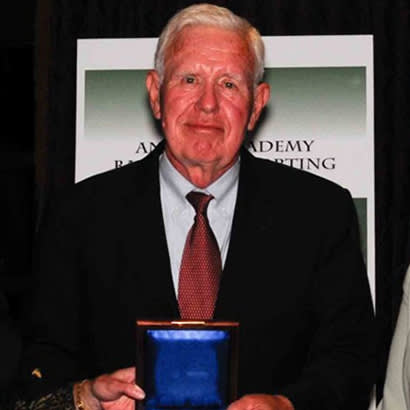
For an enhanced digital experience, read this story in the ezine.
NRPA lost one of its longest serving staff members in the history of the association on May 10, 2020, with the passing of Barry S. Tindall, NRPA’s longtime director of public policy.
“The park and recreation movement in America owes Barry Tindall a great debt of gratitude,” says Patrick F. Noonan, chairman emeritus of The Conservation Fund, former president of The Nature Conservancy and member of President Ronald Reagan’s influential President’s Commission on Americans Outdoors (1985–1987). “Barry was at the forefront of ideas and thinking about what the nation needed and what could be done to ensure a legacy for conservation, parks and recreation,” says Noonan. “I feel proud to have known him. The park and recreation movement is largely what it is today because of his contributions and ideas.”
Tindall began work at NRPA in 1967 after receiving a degree from North Carolina State University in park and recreation administration. He served in a variety of roles as liaison to national groups and nonprofits on national policy and federal legislation. He planned the first Federal Aid Institute at NRPA’s Annual Conference that led to development of NRPA’s annual Legislative Forums in Washington, D.C., which drew NRPA members from across the country to advocate for funding for parks and recreation.
Tindall was appointed director of public policy at NRPA in 1975, a position he held until his retirement in 2005. His contributions to gaining passage of critical federal legislation benefiting P&R and to the development of national public policy cannot be overstated. He fought fiercely for appropriations for the Land and Water Conservation Fund (LWCF), and was instrumental in gaining legislation and funding for urban parks and recreation. He championed greater involvement of parks and recreation in the U.S. Department of Agriculture summer food programs, the inclusion of recreation services for children and youth in high-risk environments, regulations regarding therapeutic recreation and accessibility, and promoted public health in P&R.
James Kozlowski, associate professor in the School of Sport, Recreation and Tourism at George Mason University in Virginia, and author of the “Law Review” column in Parks & Recreation magazine, believes that Tindall’s greatest accomplishment was his leadership on the LWCF stateside program. “Barry led the charge for NRPA on Capitol Hill every year to secure those appropriations for LWCF, greatly benefitting local and state parks and recreation.”
Tindall’s accomplishments were recognized by the U.S. Department of Interior’s renowned award for public service in 1992, and in 2013, the American Academy for Park and Recreation Administration’s prestigious award, the Cornelius Amory Pugsley medal, that “recognizes outstanding contributions to the promotion and development of public parks and conservation in the United States.”
Jane Adams, former Western regional director of NRPA and executive director of the California Recreation and Park Society, says, “As a park and recreation professional, I felt Barry Tindall was the voice of NRPA on federal legislative issues. He was relentless in his push for LWCF for decades, and he served as the voice for local and state government’s access to those federal dollars. He was thoughtful, kind and a great listener. Barry is one of the best advocates I have ever met.”
Mike Phillips, former NRPA public policy manager, says, “Barry never met a stranger. He could talk to anyone and everyone.” Phillips says his access to administrative staff and legislative aides to members of Congress was legendary. “He was a mentor, a teacher and a friend and I will miss him greatly.”
Many at NRPA remember Barry with great fondness, and his legacy will live long. Perhaps Noonan remembers Barry best: “When I hear his name, I have a great smile.”
Richard J. Dolesh is an Editor at Large for Parks & Recreation magazine.

